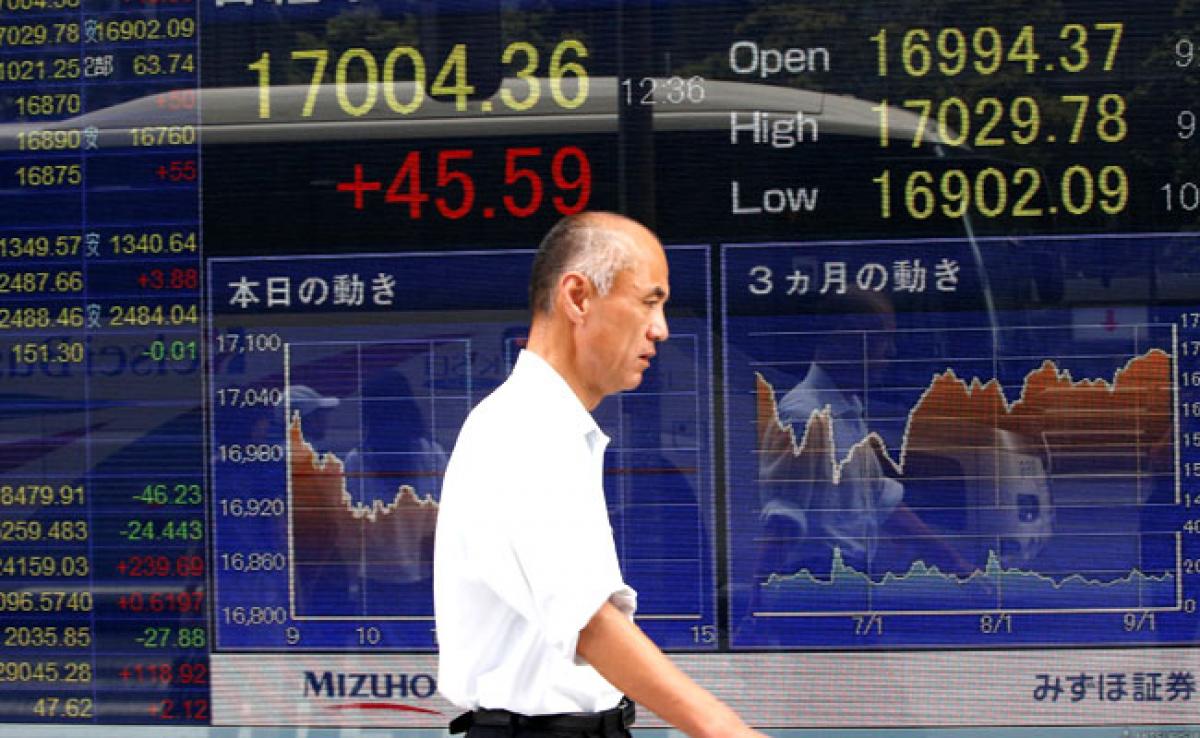Live
- Erdogan ready' to meet Assad to normalise Turkey-Syria relations
- Open exam should be conducted for selecting SC judges: Rajasthan MP
- Security forces raze 468 bunkers set up by militants, armed groups since violence began in Manipur
- Centre clears appointment of three additional judges in Madras HC
- 1st Test: I’ve seen him work so hard for this, Gill praises Pant after stellar Test comeback
- PM Modi receives grand welcome from Indian community on arrival in US
- Happy Daughter’s Day 2024: Heartfelt Wishes, Quotes, and Messages to Share
- Formula 1: Lando Norris claims pole following Sainz’s crash in Singapore Qualifying
- National Daughter’s Day Celebrating the Joy of Daughters
- Shardiya Navratri 2024: Essential Items to Remove from Your Home Before the Festival
Just In

Asian stocks edged lower on Wednesday after a strong start to the week due to profit-taking as investors lacked conviction to buy risky assets before a U.S. policy meeting next week that may see interest rates rising for the second time in three months.
Asian stocks edged lower on Wednesday after a strong start to the week due to profit-taking as investors lacked conviction to buy risky assets before a U.S. policy meeting next week that may see interest rates rising for the second time in three months.
MSCI's broadest index of Asia-Pacific shares outside Japan eased 0.1 percent in early trade, a day after posting its biggest single-day rise in more than two weeks. Japan and Australia led losers.
The Federal Reserve has a policy meeting on March 14-15 and markets have quickly ratcheted up bets of a rate hike at the meeting after recent hawkish comments by U.S. policymakers.
Investors have rushed to buy stocks and emerging market debt this year as they had previously expected the Fed to raise rates only gradually and as recent data from Asia such as trade have surprised on the upside, cementing the view of recovering global momentum.
But with valuations nearing the top of their historical trading ranges, some analysts are predicting investors will turn increasingly cautious.
"While the global economy appears healthier, trade protectionism concerns remain well and truly alive and the situation is becoming more complex," said Philip Wee, a Singapore-based currency strategist at DBS.
China's trade data due later on Wednesday may show export growth at multi-year highs boosted by recovering global demand. On Tuesday, key exporter Taiwan reported solid shipments for the first two months of 2017.
While Asian stocks remain cheaper versus their U.S. counterparts, they are approaching the upper end of a historical trading band on a price-to-earnings basis, according to Thomson Reuters data.
Within Asia, Hong Kong stocks held firm propped up by the services sector and extended inflows from the Chinese mainland. Inflows into Hong Kong stocks from China via two stock connect schemes have crossed the $7 billion mark so far this year, outpacing ETF and active flows, Goldman Sachs said.
Bond markets are also scenting a rate hike around the corner with 10-year U.S. Treasury yields poised to break out of a three-month trading range. On Wednesday, it was at 2.54 percent, compared with 2.49 percent on Friday.
That hasn't stop investors from piling into Asian debt. An index measuring the yield of a basket of dollar-denominated bonds from Asian high grade companies held firm at 4.6 percent.
U.S. stocks ended lower on Tuesday, putting the S&P 500 and the Dow Jones Industrial Average in their first consecutive sessions of decline in more than a month. E-mini futures were trading lower in Asia.
"Unless the (U.S.) February payrolls report due on March 10 is an unmitigated disaster, an outcome we do not expect, a March 15 hike is on the way," Societe Generale strategists said.
Higher yields have brightened the dollar's outlook in recent days with the greenback changing hands at 113.91 Japanese yen, compared with 111.75 at end-February though the U.S. outlook on rates will be a key driver in the coming days.
Commodity markets painted a slightly more cautious picture with copper prices stabilising after recent sharp falls while oil prices stuck to recent trading ranges. Global benchmark Brent fell 0.6 percent to $55.61 per barrel.

© 2024 Hyderabad Media House Limited/The Hans India. All rights reserved. Powered by hocalwire.com







